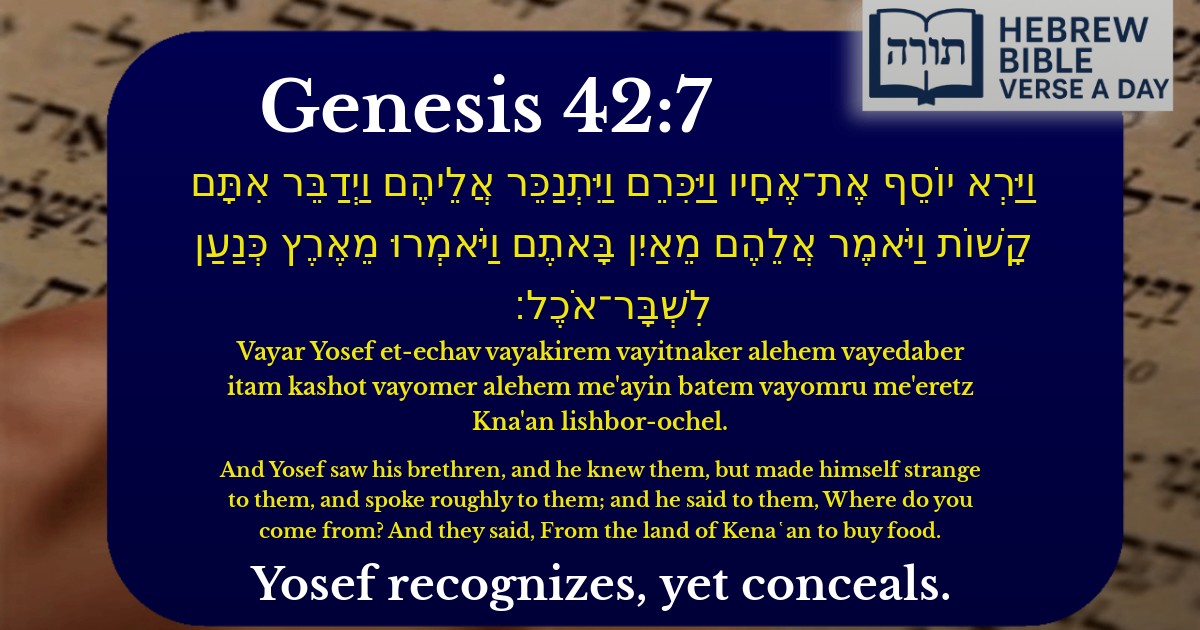Join Our Newsletter To Be Informed When New Videos Are Posted
Join the thousands of fellow Studends who rely on our videos to learn how to read the bible in Hebrew for free!
Hebrew Text
וַיַּרְא יוֹסֵף אֶת־אֶחָיו וַיַּכִּרֵם וַיִּתְנַכֵּר אֲלֵיהֶם וַיְדַבֵּר אִתָּם קָשׁוֹת וַיֹּאמֶר אֲלֵהֶם מֵאַיִן בָּאתֶם וַיֹּאמְרוּ מֵאֶרֶץ כְּנַעַן לִשְׁבָּר־אֹכֶל׃
English Translation
And Yosef saw his brethren, and he knew them, but made himself strange to them, and spoke roughly to them; and he said to them, Where do you come from? And they said, From the land of Kena῾an to buy food.
Transliteration
Vayar Yosef et-echav vayakirem vayitnaker alehem vayedaber itam kashot vayomer alehem me'ayin batem vayomru me'eretz Kna'an lishbor-ochel.
Hebrew Leining Text
וַיַּ֥רְא יוֹסֵ֛ף אֶת־אֶחָ֖יו וַיַּכִּרֵ֑ם וַיִּתְנַכֵּ֨ר אֲלֵיהֶ֜ם וַיְדַבֵּ֧ר אִתָּ֣ם קָשׁ֗וֹת וַיֹּ֤אמֶר אֲלֵהֶם֙ מֵאַ֣יִן בָּאתֶ֔ם וַיֹּ֣אמְר֔וּ מֵאֶ֥רֶץ כְּנַ֖עַן לִשְׁבׇּר־אֹֽכֶל׃
וַיַּ֥רְא יוֹסֵ֛ף אֶת־אֶחָ֖יו וַיַּכִּרֵ֑ם וַיִּתְנַכֵּ֨ר אֲלֵיהֶ֜ם וַיְדַבֵּ֧ר אִתָּ֣ם קָשׁ֗וֹת וַיֹּ֤אמֶר אֲלֵהֶם֙ מֵאַ֣יִן בָּאתֶ֔ם וַיֹּ֣אמְר֔וּ מֵאֶ֥רֶץ כְּנַ֖עַן לִשְׁבׇּר־אֹֽכֶל׃
🎵 Listen to leining
Parasha Commentary
📚 Talmud Citations
This verse is quoted in the Talmud.
📖 Chullin 91a
The verse is referenced in a discussion about Joseph's behavior towards his brothers and the concept of recognizing others while concealing one's own identity.
📖 Megillah 16b
The verse is cited in the context of discussing the themes of recognition and concealment in biblical narratives.


Yosef Recognizes His Brothers
The verse states, "וַיַּרְא יוֹסֵף אֶת־אֶחָיו וַיַּכִּרֵם" ("And Yosef saw his brethren, and he knew them"). Rashi explains that Yosef recognized them as his brothers, but they did not recognize him because he had left them as a beardless youth and now appeared with a full beard. Additionally, the Midrash (Bereshit Rabbah 91:7) notes that Yosef recognized them because they stood before him as submissive supplicants, fulfilling his earlier dreams of their bowing to him.
Yosef's Disguised Behavior
The verse continues, "וַיִּתְנַכֵּר אֲלֵיהֶם" ("but made himself strange to them"). Ramban suggests that Yosef deliberately concealed his identity to test whether his brothers had repented for selling him. The Talmud (Chagigah 4b) also discusses the concept of hastarat panim (the hiding of Divine Providence), implying that Yosef's actions were part of a larger divine plan to bring about reconciliation.
Yosef's Harsh Speech
The verse states, "וַיְדַבֵּר אִתָּם קָשׁוֹת" ("and spoke roughly to them"). The Sforno explains that Yosef spoke harshly to gauge their reactions—whether they would defend Binyamin or abandon him as they had once abandoned Yosef. This was a test of their moral growth. The Kli Yakar adds that Yosef's stern demeanor was necessary to maintain his disguise as an Egyptian ruler.
The Brothers' Response
When Yosef asks, "מֵאַיִן בָּאתֶם" ("Where do you come from?"), the brothers reply, "מֵאֶרֶץ כְּנַעַן לִשְׁבָּר־אֹכֶל" ("From the land of Canaan to buy food"). The Ohr HaChaim highlights that their mention of Canaan—the land promised to their forefathers—was a subtle plea for mercy, invoking their sacred heritage. The Netziv (Ha'amek Davar) notes that their straightforward answer reflects their humility and sincerity in seeking sustenance during the famine.
Lessons from the Verse